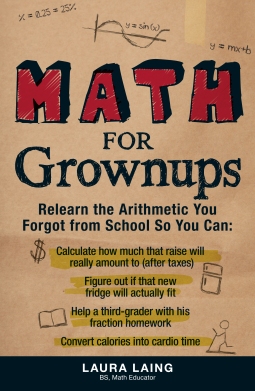No doubt you’ve heard the terms “growth mindset” and “fixed mindset” bandied about in relation to learning. While they’re not new ideas, these concepts are very “buzzy” right now in everywhere from the classroom to the boardroom.

Last year, my son mentioned that his high school math teacher repeatedly brought up the growth mindset philosophy when teaching. Initially, I thought that was quite fascinating and odd — I mean, how does a growth mindset matter in a math classroom?
But, of course, it does! Many people have a fear of mathematics and feel they’re not clever enough to learn advanced math or that their brain doesn’t work that way. I know I used to think, “Well, I’m just not a math person” so I didn’t try to excel in that subject – I merely tried to pass the class. However, if we go into our math (or chemistry or art or aerobics or welding) class knowing that we are all capable of learning new things, we will be better able to relax, comprehend the information and then learn or adapt.
If At First You Don’t Succeed…
So, what is “growth mindset” exactly? According to Carol Dweck, the Standford professor who coined the phrase and wrote the groundbreaking book, Mindset: The New Psychology of Success, someone who employs a growth mindset understands that learning is always possible – no matter your status, past successes/failures or accreditation. The concept reminds me of the old adage, “If at first you don’t succeed, try, try again…” However, according to Dweck, it’s more than just a positive outlook.
From the book’s overview: “People with a fixed mindset—those who believe that abilities are fixed—are far less likely to flourish than those with a growth mindset—those who believe that abilities can be developed through hard work, good strategies, and mentorship…”
Growth Mindset Parenting
Beyond math and classroom learning, we can also apply “growth mindset” to parenting. In my mind, having a growth mindset is somewhat tied to the idea of resiliency which I wrote about recently. In a way, to be resilient is to not let past failures define you. This can be taught to your kids as well.
We can teach our children that none of us are perfect or successful in everything but that we can all set goals we’d like to achieve – this can be social, emotional, spiritual, academic, athletic, long-term or short-term. If we go in with a growth mindset – understanding that we are physically capable of achievement and set realistic goals – and put the work in to achieve them – then we don’t have to let our own (or other peoples’) ideals and expectations define us.

Photo by Pixabay on Pexels.com
This is a massive concept and one that can be explored from many angles. I love this post on the “Children’s Library Lady” web site which focuses on books related to growth mindset. Through her post, I’ve learned that there are many ways to incorporate this vital concept into parenting and kids’ everyday learning. It’s a idea that, if used properly, can benefit us and our children for the rest of their lives.
Do you incorporate growth mindset into your parenting style? If so, how? I’d love to hear from you. Feel free to comment below.
Happy Growing!
Lisa
Please note: This post contains affiliate links which means that, if you decided to click on and purchase one of the items listed in this post, I may receive a small commission at no additional expense to you.
And, I apologize for getting off-schedule with my weekly posts. I had surgery about a month ago and then a nasty case of strep throat and am now getting to a place where I can focus on work and blogging. Thank you for your recent comments, messages and emails.
—


